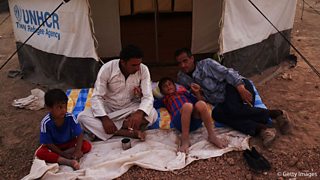A step backwards: media in today's Iraq
Haider Al-Safi
is head of project, consolidating media freedoms in Iraq, Βι¶ΉΤΌΕΔ Media Action. Twitter: @Haider888
Tagged with:

Iraqi men and children sit outside their tent in a camp for people fleeing fighting around the city of Mosul.
As news came in earlier this month that the had taken Iraq's second largest city, Mosul, I turned on my TV and satellite box in London to see how Iraqi TV channels were covering the crisis. To my surprise, what I saw transported me back to my life in Iraq during Saddam Hussein's three wars. Once again, I saw a presenter on one of the pro-government channels wearing military uniform. Once again, I heard the popular chanting and poetry that the Ba'ath regime's propaganda machine had used to fill the airwaves.
Media in Iraq is split across a sectarian and political divide. In response to the advance by ISIS, channels affiliated with the current Shia government have fallen back into such old habits, none more so than the publicly-funded broadcaster, the Iraqi Media Network.
In an interview with the local Iraqi newspaper Alalem about his channel's coverage, Iraqi Media Network's head Abdul Jabar Al Shaboot said that "broadcasting patriotic songs, and national military anthems is something which any country will do in the circumstances. It's about winning hearts."
Following pressure from the Iraqi government, the Iraqi regulator, the Communications and Media Commission, has also overstepped its professional regulatory role and issued recommendations that the media should not publish photos, footage or statements from ISIS and that they should highlight the military achievements of the Iraqi army.
Some politicians have gone further by accusing anyone who is not pro-actively backing the government's battle for hearts and minds of supporting terrorism and "aligning" themselves with ISIS. The Iraqi government have come out in condemnation of pan-Arab channels such as the Saudi-backed Al Arabiya for using the expression "tribal rebels" rather than "ISIS terrorists" in their coverage.
Seizing an opportunity to show loyalty to the government, channels such as Afaq TV or Al Ahad, are also now displaying their religious or ethnic allegiances. They have slipped into sectarian speech either directly or indirectly through on-air contributors.
In contrast, ISIS is using the latest media methods: have been created to spread their message and recruit new followers.
While the Iraqi national media play their poetry and propaganda, it is images and statements by ISIS that are appearing in the main headlines of some local news agencies – and in the international media.
As part of a wide-scale project, we at Βι¶ΉΤΌΕΔ Media Action have been working to improve the media landscape in Iraq and the provisions for freedom of information and freedom of expression, as well as supporting public service broadcasting that fulfils the needs of nation building.
In April this year, we introduced a new broadcasting code of practice which was signed off by the board of governors of the Iraqi Communication and Media Commission. This new code talk specifically about how to cover acts of terrorism and how not to slip into broadcasting ethnic or religious hate speech.
With emotions running so high and the country in danger of fracturing deeply along a sectarian divide, it is perhaps more important than ever that regulators and public service broadcasters fulfil a professional role.
We hope to work closely with the regulator to bring it back to comply with these professional standards rather than fall back on the ways of the old regime in our digital age. A firm commitment to the new code of practice for broadcasters can’t come soon enough.
Consolidating Media Freedom is a strategic programme funded by the UK government’s Foreign and Commonwealth Office, the United States government's Department for Democracy, Human Rights and Labour and EuropeAid.
Related links
Read:
Follow Βι¶ΉΤΌΕΔ Media Action on and
